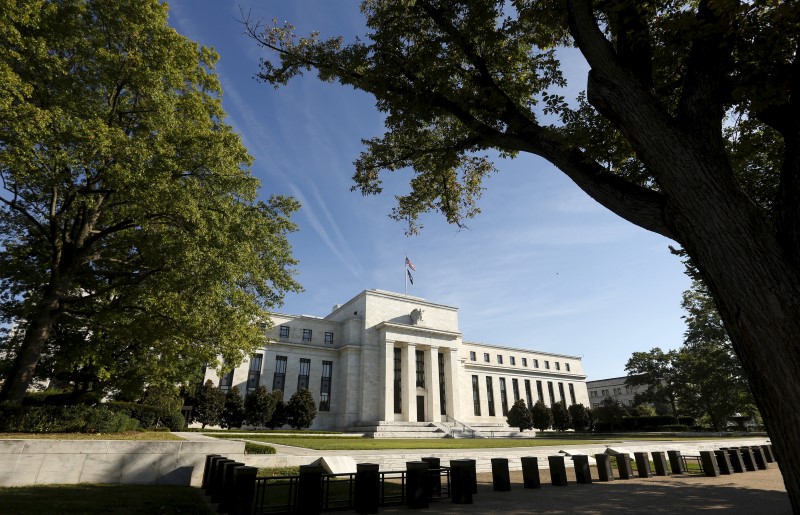By Sumanta Dey and Deepti Govind
(Reuters) - The U.S. Federal Reserve will wait until the fourth quarter before raising interest rates, likely in December after the presidential election, according to a Reuters poll which once again showed subdued inflation expectations.
That would mark a climb-down from the four hikes in 2016 Fed policymakers had estimated at the start of the year and highlights the challenges they face despite a solid economy, with global risks rising after Britain's vote to leave the European Union.
Just over half the 100 economists surveyed over the past week expect the Fed to raise its federal funds rate in the fourth quarter to 0.50-0.75 percent from 0.25-0.50 percent currently. The move is most likely to come in December as the November policy meeting is only days ahead of the Nov. 8 election, forecasters said.
The rest of the respondents are split between forecasting a rise in the third quarter of this year -- likely in September as the Fed has given no hint it is about to raise rates at its meeting this month -- and sometime in 2017.
Forecasts for a rate rise this year have already been pushed back three times since January, when a Reuters poll predicted one would come no later than March. The Fed's peers from Europe to Asia, meanwhile, are still easing.
"All Fed commentary to date has suggested they will proceed very patiently and very gradually in normalizing policy. Our sense is the Fed might be extra cautious moving on rates close to the election since they'll have to be seen as politically neutral," said Sal Guatieri, economist at BMO Capital Markets.
"Based on our view of how the economy will perform over the next six months and (considering) the U.S. is pretty close to full employment now ... December is probably as good a time as any to move next."
The poll forecast two more rises next year, taking the fed funds rate to 1.00-1.25 percent at the end of 2017.
Asked what the top risks to the U.S. economy were heading into the election, a majority of respondents in the Reuters poll picked an unexpected slowdown in hiring and business investment. A strong dollar was number three in the list.
Morgan Stanley (NYSE:MS), which forecasts a 40 percent chance of recession in the coming year, along with RBS (LON:RBS) are the only primary dealers surveyed which predicted the Fed won't hike rates again at all between now and the end of next year.
The range of probabilities for recession in the next 12 months was 5 to 60 percent, although the consensus likelihood was just one-in-five. Growth is forecast to remain slightly above an annualized rate of 2 percent in each quarter through end-2017, with slight downgrades compared to the June poll.
WHERE'S THE INFLATION?
With unemployment at 4.9 percent in June and likely to fall further, most say the Fed can probably check off as achieved its objective of full employment. But inflation is still short of its 2 percent goal and is not expected to take off.
The latest poll found the U.S. core PCE price index, the Fed's preferred inflation gauge, will average 1.9 percent in the fourth quarter. It is currently at 1.6 percent.
Market gauges such as bond yields and swaps, private economists' forecasts, as well as surveys of U.S. consumers are all still showing low inflation expectations.
Benchmark 10-year Treasury yields sank to record lows in the past month after the Brexit vote on June 23, as investors fearing a global financial market sell-off fled to safe-haven assets.
The U.S. dollar rallied over 4 percent in the same period, putting an additional downward pressure on imported inflation.
In normal course, inflation and wages tend to pick up as the unemployment rate falls. That hasn't happened yet in any serious measure, partly due to falling oil prices, overcapacity and relatively weak demand at home and abroad.
"With wage growth expected to continue its slow ascent, we see no threat to broader price increases from the labor market," Morgan Stanley economists wrote, adding that 2017 will likely "mark the ninth consecutive year below the Fed's 2 percent inflation goal."

(For other stories from the Reuters global economic polls:)
(Polling and analysis by Krishna Eluri and Vartika Sahu; Editing by Ross Finley and Jeffrey Hodgson)